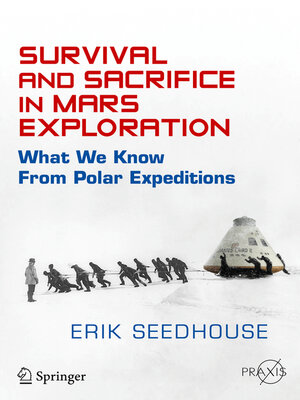Survival and Sacrifice in Mars Exploration
ebook ∣ What We Know from Polar Expeditions · Springer Praxis Books
By Erik Seedhouse

Sign up to save your library
With an OverDrive account, you can save your favorite libraries for at-a-glance information about availability. Find out more about OverDrive accounts.
Find this title in Libby, the library reading app by OverDrive.



Search for a digital library with this title
Title found at these libraries:
| Loading... |
With current technology, a voyage to Mars and back will take three
years. That's a lot of time for things to go wrong. But sooner or later
a commercial enterprise will commit itself to sending humans to Mars.
How will the astronauts survive? Some things to consider are:
ith current technology, a voyage to Mars and back will take threeyears. That's a lot of time for things to go wrong. But sooner or later
a commercial enterprise will commit itself to sending humans to Mars.
How will the astronauts survive? Some things to consider are:
crew?
What is the relative weight of mission success and the health of thecrew?
mission?
Do we allow crewmembers to sacrifi ce their lives for the good of themission?
return to Earth or give the member a burial in space?
Questions like these, and hundreds of others, have been explored by
science fi ction, but scant attention has been paid by those designing
missions. Fortunately, the experience gained in polar exploration more
than 100 years ago provides crews and mission planners with a framework
to deal with contingencies and it is this that forms the core of this book.
Why the parallels between polar and space exploration? Because polar
exploration offers a better analogy for a Mars mission today than those
invoked by the space community. Although astronauts are routinely
compared to Lewis and Clark, Mars-bound astronauts will be closer in their
roles to polar explorers. And, as much as space has been described as a
New Frontier, Mars bears greater similarity to the polar regions, which is
why so much can be learned from those who ventured there.
And what if a crewmember does perish? Do we store the body forreturn to Earth or givethe member a burial in space?Questions like these, and hundreds of others, have been explored by
science fi ction, but scant attention has been paid by those designing
missions. Fortunately, the experience gained in polar exploration more
than 100 years ago provides crews and mission planners with a framework
to deal with contingencies and it is this that forms the core of this book.
Why the parallels between polar and space exploration? Because polar
exploration offers a better analogy for a Mars mission today than those
invoked by the space community. Although astronauts are routinely
compared to Lewis and Clark, Mars-bound astronauts will be closer in their
roles to polar explorers. And, as much as space has been described as a
New Frontier, Mars bears greater similarity to the polar regions, which is
why so much can be learned from those who ventured there.






